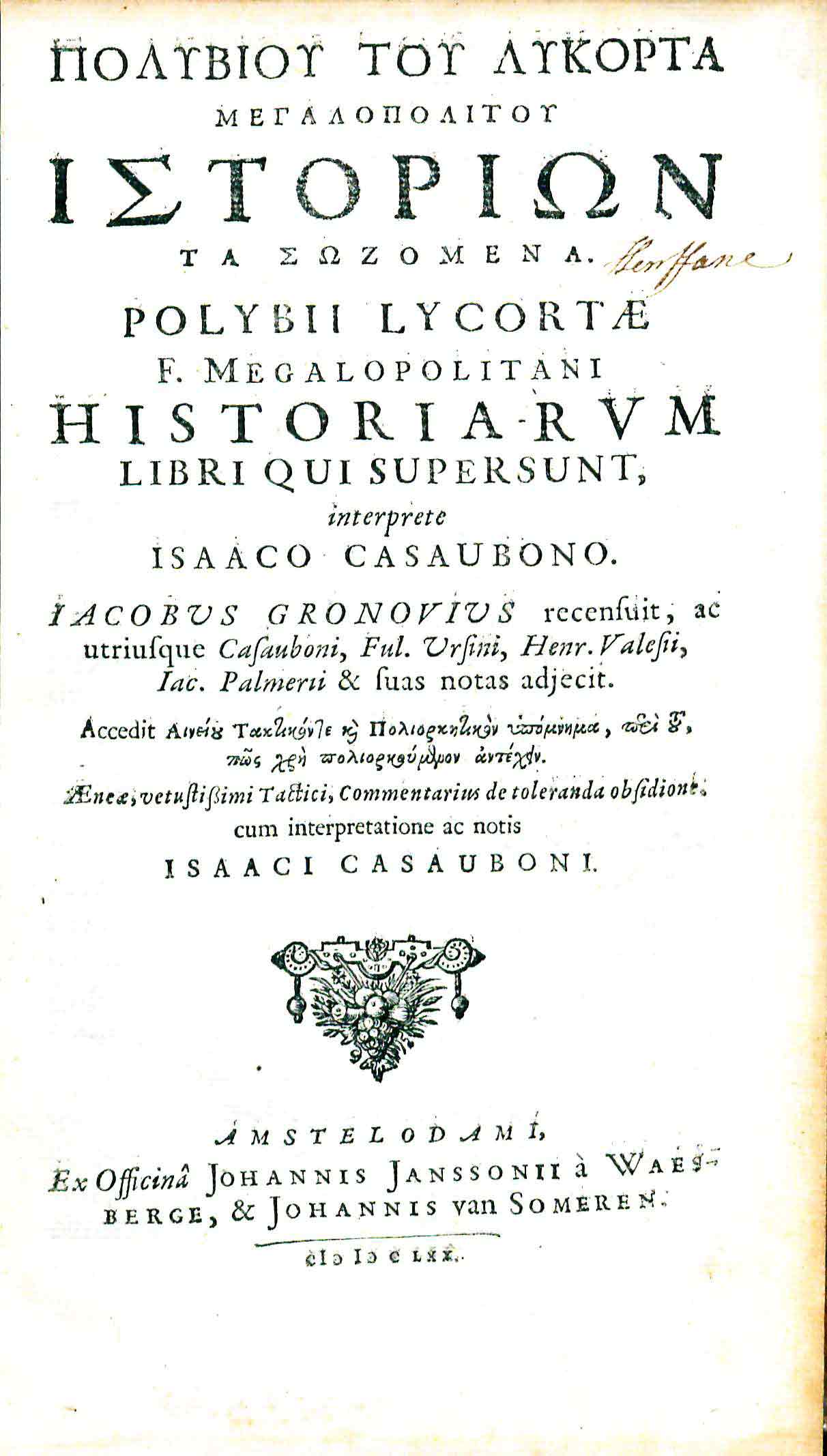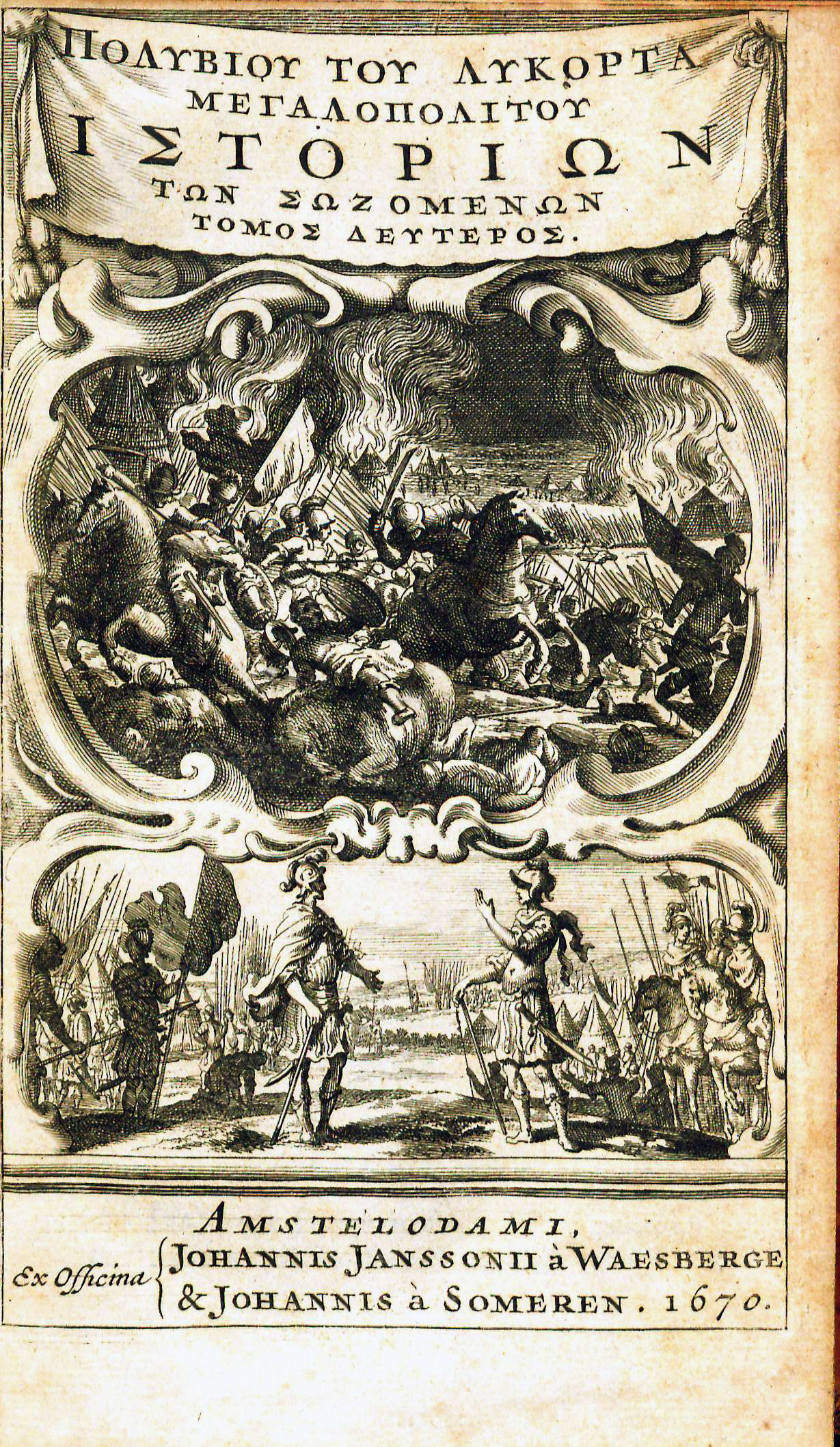Difference between revisions of "Historiōn ta Sōzomena"
m (→Evidence for Inclusion in Wythe's Library) |
|||
| (21 intermediate revisions by 10 users not shown) | |||
| Line 1: | Line 1: | ||
| − | {{DISPLAYTITLE: | + | {{DISPLAYTITLE:''Historiōn ta Sōzomena: Polybii Lycortae F. Megalopolitani Historiarum Libri qui Supersunt''}} |
| − | |||
===by Polybius=== | ===by Polybius=== | ||
| − | |||
{{BookPageInfoBox | {{BookPageInfoBox | ||
|imagename=PolybiusHistorionTaSozomena.jpg | |imagename=PolybiusHistorionTaSozomena.jpg | ||
| − | |link=https:// | + | |link=https://wm.primo.exlibrisgroup.com/permalink/01COWM_INST/g9pr7p/alma991023232679703196 |
|shorttitle=Historiōn ta Sōzomena | |shorttitle=Historiōn ta Sōzomena | ||
| − | |author=Polybius | + | |author=[[:Category:Polybius|Polybius]] |
| − | |lang=Latin | + | |trans=Issac Casaubon |
| − | |publoc=Amstelodami | + | |editor=[[:Category:Jacobus Gronovius|Jacobus Gronovius]] |
| + | |lang=[[:Category:Greek|Greek]] and [[:Category:Latin|Latin]] | ||
| + | |publoc=[[:Category:Amsterdam|Amstelodami]] | ||
|publisher=Officina Johannis Janssonii à Waesberge, & Johannis van Someren | |publisher=Officina Johannis Janssonii à Waesberge, & Johannis van Someren | ||
|year=1670 | |year=1670 | ||
| − | }} | + | |set=3 volumes in 5 |
| + | |desc=[[:Category:Octavos|8vo (18 cm.)]] | ||
| + | |shelf=I-3 | ||
| + | }}[[File:PolybiusHistorionTaSozomena1670v3HalfTitle.jpg |left|thumb|250px|<center>Half-title, volume three.</center>]][[wikipedia:Polybius|Polybius]] (c. 200 BCE–c. 118 BCE) was born in [[wikipedia:Arcadia|Arcadia]], a region of Greece, around 200 BCE to a member of the Achaean confederacy ruling Greece. He became ''hipparchos'' (cavalry commander) of the confederacy in 169, but this victory was short-lived when he was included in a group of one thousand prominent Achaeans deported to Rome in 168. This “political purge” followed the Roman conquest of Macedonia, and resulted in Polybius being kept in Italy for sixteen years without a trial.<ref>M.C. Howatson, ed. "[http://www.oxfordreference.com/view/10.1093/acref/9780199548545.001.0001/acref-9780199548545-e-2447 Poly'bius]" in ''The Oxford Companion to Classical Literature'' (Oxford: Oxford University Press, 2011).</ref> Polybius befriended and mentored powerful Roman general and politician [[wikipedia:Scipio Aemilianus|Cornelius Scipio Aemilianus] and was consequently allowed to stay in Rome, interspersed with various political and military trips to Spain and Carthage.<ref>Ibid.</ref> Following the [[wikipedia:Battle of Corinth (146 BC)|Roman sack of Corinth]] in 146 BCE, Polybius “helped to usher in the Roman settlement of Greece.”<ref>John Roberts, ed. "[http://www.oxfordreference.com/view/10.1093/acref/9780192801463.001.0001/acref-9780192801463-e-1767 Polybius]" in ''Oxford Dictionary of the Classical World'' (Oxford: Oxford University Press, 2007).</ref> | ||
| + | |||
| + | Polybius is unique for being the only Hellenistic historian for whom a substantial amount of his works survives. Though all of his minor works are gone, the first five books of his ''Histories'' remain in their entirety, and many excerpts and quotations from the remainder of the forty books are preserved by other writers. In his introduction, Polybius states that his purpose in writing the ''Histories'' was to “describe and explain Rome’s rise to world dominion” in just under 53 years.<ref>Ibid.</ref> His belief that the perfection of the Roman constitution, “an even blend of monarchical, aristocratic, and democratic elements as he saw it” was responsible for the greatness of Rome had long-term impacts on influential Romans and historians.<ref>Howatson, "Poly'bius."</ref> Written in Greek, his history was primarily intended for Greeks, though also included were upper-class Romans who knew Greek. Aiming to be useful to his contemporaries, Polybius took a political approach to his history, explaining and analyzing wars and politics while avoiding emotional or cultural factors. Polybius was one of the first historians to attribute a role in Rome’s success to Fortune. Although he steers clear of giving divinities credit, but emphasizes Rome’s success being a result of her own merits.<ref>Ibid.</ref> | ||
| + | |||
| + | This particular edition is a Latin translation of what remains of Polybius’s ''Histories''. | ||
==Evidence for Inclusion in Wythe's Library== | ==Evidence for Inclusion in Wythe's Library== | ||
| − | Listed twice in the [[Jefferson Inventory]] of [[Wythe's Library]] as | + | |
| + | Listed twice in the [[Jefferson Inventory]] of [[Wythe's Library]] as "Polybius. Gr. Lat. 3.v. 8vo." [[Thomas Jefferson]] gave one copy to [[John Wayles Eppes]] and the other to [[Thomas Jefferson Randolph]]. Jefferson had sent at least one of these copies to Wythe from Paris.<ref>See [[Thomas Jefferson to Wythe, 16 September 1787]], page 5.</ref> Brown's Bibliography<ref>Bennie Brown, "The Library of George Wythe of Williamsburg and Richmond," (unpublished manuscript, May, 2012) Microsoft Word file. Earlier edition available at: https://digitalarchive.wm.edu/handle/10288/13433.</ref> includes the 1763-64 edition of Polybius published in Leipzig based on an edition Jefferson sold to the Library of Congress.<ref>E. Millicent Sowerby, ''Catalogue of the Library of Thomas Jefferson'', (Washington, D.C.: The Library of Congress, 1952-1959), 1:25 [http://babel.hathitrust.org/cgi/pt?id=mdp.39015033648091;view=1up;seq=55 [no.51]].</ref> Barbara Dean lists the 1670 Amsterdam edition in her [[Dean Bibliography|bibliographic memo]].<ref>[[Dean Bibliography|Memorandum from Barbara C. Dean]], Colonial Williamsburg Found., to Mrs. Stiverson, Colonial Williamsburg Found. (June 16, 1975), 5 (on file at Wolf Law Library, College of William & Mary).</ref> [http://www.librarything.com/profile/GeorgeWythe George Wythe's Library]<ref>''LibraryThing'', s.v. [http://www.librarything.com/profile/GeorgeWythe Member: George Wythe]," accessed on June 28, 2013.</ref> on LibraryThing indicates "Precise edition unknown." Because we do not know which edition Wythe owned, the Wolf Law Library followed Dean's choice and purchased a copy of the 1670 Amsterdam edition when a copy became available. | ||
| + | [[File:PolybiusHistorionTaSozomena1670v5Headpiece.jpg|left|thumb|350px|<center>Headpiece, first page of text, volume five.</center>]] | ||
==Description of the Wolf Law Library's copy== | ==Description of the Wolf Law Library's copy== | ||
| + | |||
Bound in later full calf, uniformly bound, with raised bands and spines in six panels. Has morocco title label to second panel, contrasting morocco volume label to third, and remaining panels with gilt central lozenge and volute corner pieces. Gilt rolled border to covers with all edged marbled and blue endpapers. Purchased from Temple Rare Books. | Bound in later full calf, uniformly bound, with raised bands and spines in six panels. Has morocco title label to second panel, contrasting morocco volume label to third, and remaining panels with gilt central lozenge and volute corner pieces. Gilt rolled border to covers with all edged marbled and blue endpapers. Purchased from Temple Rare Books. | ||
| − | View this book in [https:// | + | Images of the library's copy of this book are [https://www.flickr.com/photos/wolflawlibrary/sets/72157637697547003 available on Flickr.] View the record for this book in [https://wm.primo.exlibrisgroup.com/permalink/01COWM_INST/g9pr7p/alma991023232679703196 William & Mary's online catalog.] |
| − | ===References | + | |
| + | ==See also== | ||
| + | *[[George Wythe Room]] | ||
| + | *[[Jefferson Inventory]] | ||
| + | *''[[Polybiou tou Lykorta Megalopolitou Historiōn ta Sōzomenea|Polybiou tou Lykorta Megalopolitou Historiōn ta Sōzomenea = Polybii Lycortae F. Megalopolitani Historiarum Libri qui Supersunt]]'' | ||
| + | *[[Wythe's Library]] | ||
| + | |||
| + | ==References== | ||
<references/> | <references/> | ||
[[Category:Ancient History]] | [[Category:Ancient History]] | ||
[[Category:George Wythe Collection at William & Mary's Wolf Law Library]] | [[Category:George Wythe Collection at William & Mary's Wolf Law Library]] | ||
| + | [[Category:Jacobus Gronovius]] | ||
| + | [[Category:John Wayles Eppes' Books]] | ||
| + | [[Category:Polybius]] | ||
| + | [[Category:Thomas Jefferson Randolph's Books]] | ||
[[Category:Titles in Wythe's Library]] | [[Category:Titles in Wythe's Library]] | ||
| + | |||
| + | __NOTOC__ | ||
| + | [[Category:Amsterdam]] | ||
| + | [[Category:Greek]] | ||
| + | [[Category:Latin]] | ||
| + | [[Category:Octavos]] | ||
Latest revision as of 13:45, 21 June 2023
by Polybius
| Historiōn ta Sōzomena | |
|
Title page from Historiōn ta Sōzomena, George Wythe Collection, Wolf Law Library, College of William & Mary. | |
| Author | Polybius |
| Editor | Jacobus Gronovius |
| Translator | Issac Casaubon |
| Published | Amstelodami: Officina Johannis Janssonii à Waesberge, & Johannis van Someren |
| Date | 1670 |
| Language | Greek and Latin |
| Volumes | 3 volumes in 5 volume set |
| Desc. | 8vo (18 cm.) |
| Location | Shelf I-3 |
Polybius is unique for being the only Hellenistic historian for whom a substantial amount of his works survives. Though all of his minor works are gone, the first five books of his Histories remain in their entirety, and many excerpts and quotations from the remainder of the forty books are preserved by other writers. In his introduction, Polybius states that his purpose in writing the Histories was to “describe and explain Rome’s rise to world dominion” in just under 53 years.[4] His belief that the perfection of the Roman constitution, “an even blend of monarchical, aristocratic, and democratic elements as he saw it” was responsible for the greatness of Rome had long-term impacts on influential Romans and historians.[5] Written in Greek, his history was primarily intended for Greeks, though also included were upper-class Romans who knew Greek. Aiming to be useful to his contemporaries, Polybius took a political approach to his history, explaining and analyzing wars and politics while avoiding emotional or cultural factors. Polybius was one of the first historians to attribute a role in Rome’s success to Fortune. Although he steers clear of giving divinities credit, but emphasizes Rome’s success being a result of her own merits.[6]
This particular edition is a Latin translation of what remains of Polybius’s Histories.
Evidence for Inclusion in Wythe's Library
Listed twice in the Jefferson Inventory of Wythe's Library as "Polybius. Gr. Lat. 3.v. 8vo." Thomas Jefferson gave one copy to John Wayles Eppes and the other to Thomas Jefferson Randolph. Jefferson had sent at least one of these copies to Wythe from Paris.[7] Brown's Bibliography[8] includes the 1763-64 edition of Polybius published in Leipzig based on an edition Jefferson sold to the Library of Congress.[9] Barbara Dean lists the 1670 Amsterdam edition in her bibliographic memo.[10] George Wythe's Library[11] on LibraryThing indicates "Precise edition unknown." Because we do not know which edition Wythe owned, the Wolf Law Library followed Dean's choice and purchased a copy of the 1670 Amsterdam edition when a copy became available.
Description of the Wolf Law Library's copy
Bound in later full calf, uniformly bound, with raised bands and spines in six panels. Has morocco title label to second panel, contrasting morocco volume label to third, and remaining panels with gilt central lozenge and volute corner pieces. Gilt rolled border to covers with all edged marbled and blue endpapers. Purchased from Temple Rare Books.
Images of the library's copy of this book are available on Flickr. View the record for this book in William & Mary's online catalog.
See also
- George Wythe Room
- Jefferson Inventory
- Polybiou tou Lykorta Megalopolitou Historiōn ta Sōzomenea = Polybii Lycortae F. Megalopolitani Historiarum Libri qui Supersunt
- Wythe's Library
References
- Jump up ↑ M.C. Howatson, ed. "Poly'bius" in The Oxford Companion to Classical Literature (Oxford: Oxford University Press, 2011).
- Jump up ↑ Ibid.
- Jump up ↑ John Roberts, ed. "Polybius" in Oxford Dictionary of the Classical World (Oxford: Oxford University Press, 2007).
- Jump up ↑ Ibid.
- Jump up ↑ Howatson, "Poly'bius."
- Jump up ↑ Ibid.
- Jump up ↑ See Thomas Jefferson to Wythe, 16 September 1787, page 5.
- Jump up ↑ Bennie Brown, "The Library of George Wythe of Williamsburg and Richmond," (unpublished manuscript, May, 2012) Microsoft Word file. Earlier edition available at: https://digitalarchive.wm.edu/handle/10288/13433.
- Jump up ↑ E. Millicent Sowerby, Catalogue of the Library of Thomas Jefferson, (Washington, D.C.: The Library of Congress, 1952-1959), 1:25 [no.51].
- Jump up ↑ Memorandum from Barbara C. Dean, Colonial Williamsburg Found., to Mrs. Stiverson, Colonial Williamsburg Found. (June 16, 1975), 5 (on file at Wolf Law Library, College of William & Mary).
- Jump up ↑ LibraryThing, s.v. Member: George Wythe," accessed on June 28, 2013.


